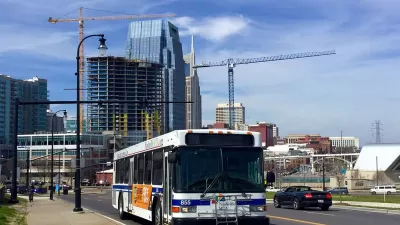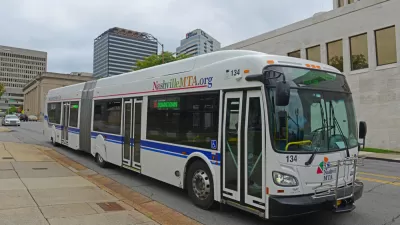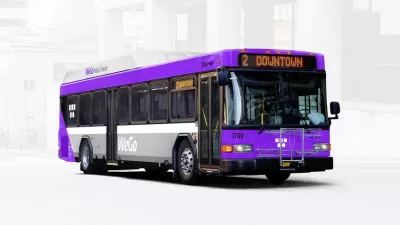Transit advocates suffered a resounding defeat in Nashville yesterday. The Let's Move Nashville plan does not have the funding to build-out its ambitiously pro-transit agenda.

"Nashville voters on Tuesday rejected a plan to raise four taxes to pay for a $5.4 billion transit plan," reports Joey Garrison.
The election was never close, even after the referendum won support from the Tennessean's editorial board a few weeks before the election.
We expect more commentary about the failure of the transit referendum to emerge in the coming days and weeks, but for now, there are reports of the opposition funding that flowed to the campaign in recent months. Angie Schmitt sounded alarms about the Koch Brothers and "dark money" influencing the campaign in April.
Writing for the Tennessean in a separate article, Alex Hubbard pins some of the blame for the loss on the resignation of Mayor Megan Barry, who was an early and active supporter of the Let's Move Nashville Plan.
Finally, the critics have certainly had their say. In the source article, Garrison summarizes the opposition, with a reference to self-driving cars.
Critics have called light rail antiquated and have contended it wouldn't do anything to cut down on traffic congestion. They've pointed to Nashville's dwindling bus ridership, the decline of ridership of legacy transit in other cities, and advancement in technology of self-driving cars, which they say will make transit obsolete.
FULL STORY: Opponents hold big lead in Nashville transit plan vote; pro-transit campaign concedes defeat

Planetizen Federal Action Tracker
A weekly monitor of how Trump’s orders and actions are impacting planners and planning in America.

Maui's Vacation Rental Debate Turns Ugly
Verbal attacks, misinformation campaigns and fistfights plague a high-stakes debate to convert thousands of vacation rentals into long-term housing.

Restaurant Patios Were a Pandemic Win — Why Were They so Hard to Keep?
Social distancing requirements and changes in travel patterns prompted cities to pilot new uses for street and sidewalk space. Then it got complicated.

In California Battle of Housing vs. Environment, Housing Just Won
A new state law significantly limits the power of CEQA, an environmental review law that served as a powerful tool for blocking new development.

Boulder Eliminates Parking Minimums Citywide
Officials estimate the cost of building a single underground parking space at up to $100,000.

Orange County, Florida Adopts Largest US “Sprawl Repair” Code
The ‘Orange Code’ seeks to rectify decades of sprawl-inducing, car-oriented development.
Urban Design for Planners 1: Software Tools
This six-course series explores essential urban design concepts using open source software and equips planners with the tools they need to participate fully in the urban design process.
Planning for Universal Design
Learn the tools for implementing Universal Design in planning regulations.
Heyer Gruel & Associates PA
JM Goldson LLC
Custer County Colorado
City of Camden Redevelopment Agency
City of Astoria
Transportation Research & Education Center (TREC) at Portland State University
Jefferson Parish Government
Camden Redevelopment Agency
City of Claremont





























